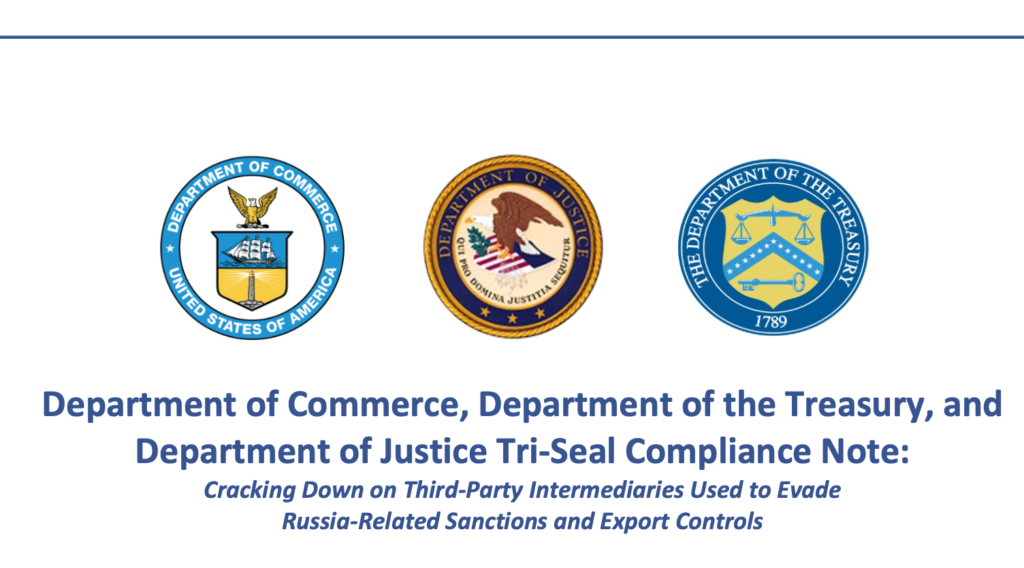In 2022, the Russian Federation surpassed other nations, including Iran, North Korea, Venezuela, and Syria, to become the most sanctioned country worldwide. Hundreds of individuals and legal entities faced asset freezes in Western countries, Japan, Australia, Singapore, New Zealand, Taiwan, and more. The list of goods banned from delivery to Russia has expanded significantly. Naturally, sanctions evasion schemes emerged, enabling Russian organizations to continue using the global financial system and acquire prohibited goods.
Over the past year, the United States and its partners have been actively expanding sanction lists targeting individuals and goods. This year, the focus appears to be on closing loopholes in existing sanctions. Efforts are concentrated on identifying schemes and intermediaries that help Russia bypass restrictive measures.
On March 2, 2022, the Bureau of Industry and Security (BIS), the U.S. Department of Justice, and OFAC’s Bureau of Sanctions Administration issued a joint statement titled «Counteracting intermediaries that help circumvent sanctions and export restrictions.» While addressed to U.S. manufacturing and trading corporations and banks, it serves as a warning to foreign individuals who may knowingly or unknowingly engage in sanctions evasion activities.
Officially, the Kyrgyz Republic has not supported any sanctions against Russia. However, in reality, the country cannot afford to ignore these measures, as doing so could result in a paralyzed financial system and an inability to trade on global markets, even for its own interests. Kyrgyzstan’s financial sector is particularly vulnerable, as its open economy makes it a financial and investment hub accessible to all.
Below, Ekonomika provides an analysis of the U.S.-published toolkit for identifying sanctions evasion, illustrating how analytical work will be conducted this year. It is important to note that even seemingly insignificant details are recommended for analysis, reflecting the utmost seriousness of the document’s authors in achieving their stated goal.
Methodological guidelines recommend identifying the following signs of sanctions circumvention (our comments are provided after a quote from the original text):
• Use of corporate structures to hide (i) ownership, (ii) source of funds, or (iii) countries involved, especially sanctioned jurisdictions.
This implies an additional obligation for banks to analyze clients» ownership structures to ensure no blacklisted persons are involved.
• Unwillingness of the customer to share information about the end use of the product, including reluctance to fill out an end user form.
For goods on prohibited lists for Russia, it is now common to require an end user form. The end consumer is scrutinized to determine if they truly need the purchased product for their own purposes. EU Special Envoy for Sanctions David Sullivan recently noted that it is suspicious when neighbouring countries of Russia «suddenly have a lot of new needs» for goods sanctioned for Russia.
• The use of shell companies for international wire transfers, often involving financial institutions in jurisdictions other than the company’s registration.
Even before the Ukrainian crisis, Western banks found it suspicious when a counterparty used a bank in another country for settlements. Although there may be legitimate reasons, heightened scrutiny is now recommended due to sanctions control.
• Failure to routinely install, train, or service purchased items.
This logical control sign suggests that if the buyer intends to act solely as an intermediary for shipping goods to a sanctioned country, they will likely refuse typical on-site equipment installation services.
• IP addresses that do not match the location data provided by the customer.
This criterion illustrates the level of control required. Under normal circumstances, trading companies may not pay attention to the IP address their buyer uses for commercial correspondence.
• Last-minute changes to shipping instructions that conflict with customer history or business practices.
As sanctions evasion schemes are constantly identified and closed, a change in the delivery country is considered suspicious. Typically, buyers use the same route and warehouses when purchasing goods from abroad.
• A payment from a third country or company not listed on the End User Application or other applicable End User Form.
It is suspicious if the declared end user of a product cannot pay for it, and a third party makes the payment instead.
• Using personal email accounts instead of company email addresses.
Many Kyrgyz enterprises use personal email accounts rather than corporate ones. Companies should consider improving their internet presence to avoid being perceived as «sanctions dodgers.»
• Managing complex and/or international businesses using residential addresses or addresses common to multiple closed legal entities.
This criterion has always been applied as suspicious, even outside the context of sanctions. A legitimate operating enterprise would not choose a mass registration address or a residential address, which is more typical of shell companies.
• Transactions related to changes in shipments or payments previously scheduled for Russia or Belarus.
Any company suddenly offered to buy ready-made batches of goods for resale should question their original intended recipient, as should the servicing bank.
• Transactions involving organizations with little to no presence on the Internet.
A lack of online information about an organization (excluding hastily created business card sites on WordPress) may indicate that the company was created for a technical purpose. A normal trading or manufacturing company leaves many traces online during its activity, and these should be analyzed according to the referenced document.
• Redirecting purchases through certain points commonly used to illegally divert prohibited items to Russia or Belarus. Such locations may include China (including Hong Kong and Macau) and jurisdictions close to Russia, including Armenia, Turkey, and Uzbekistan.
Kyrgyzstan is not directly mentioned in the document, but that does not mean its companies are exempt from increased monitoring by interested Western services and security departments of trading companies.
What negative consequences can threaten those who violate the sanctions restrictions of the United States and other countries? Evidently, shell companies created for anonymous purchases of sanctioned goods cannot be seriously affected. At most, their foreign customers» funds may be frozen, or the ordered cargo may not reach these customers. Additionally, as mentioned earlier, intermediaries selling sanctioned goods do not violate Kyrgyz law by doing so.
The main risk falls on banks, which hold customer funds in various currencies in correspondent accounts. These accounts can be frozen without any expectation of unfreezing for years, instantly destroying the bank’s business.
In conversations with our bankers, the question occasionally arises about the extent to which a bank may face sanctions due to one or two payments that violate sanctions and slip through the compliance department’s oversight. We believe that the risk of being included in the SDN (targeted blocking sanctions) list threatens those financial institutions that systematically organize settlements for goods and persons violating foreign sanctions. However, this depends on the situation.
It is important to understand that the arsenal of possible negative measures from the United States is not limited to inclusion in the sanctions list (SDN). In this context, the examples of two banks — the Latvian ABLV and the Cypriot Federal Bank of the Middle East (FBME) — are indicative. The U.S. financial monitoring body FINCEN declared the Latvian bank ABLV as «a bank that poses a risk in terms of money laundering» after it made several payments on behalf of companies associated with North Korea.
Following this, all bank accounts were immediately frozen, and the European Central Bank demanded the bank be liquidated. The Cypriot bank FBME faced a similar fate in 2015. Despite attempting to challenge the declaration of it as a «bank with the risk of money laundering» in an American court, the bank was forced into liquidation, and clients» withdrawals took place under the watchful eye of American emissaries in Cyprus. It is worth noting that large international banks, such as Commerzbank and UBS, face fines in the United States for working with sanctioned companies — though in some cases, these fines can reach billions of dollars.
Alexei Gorin





